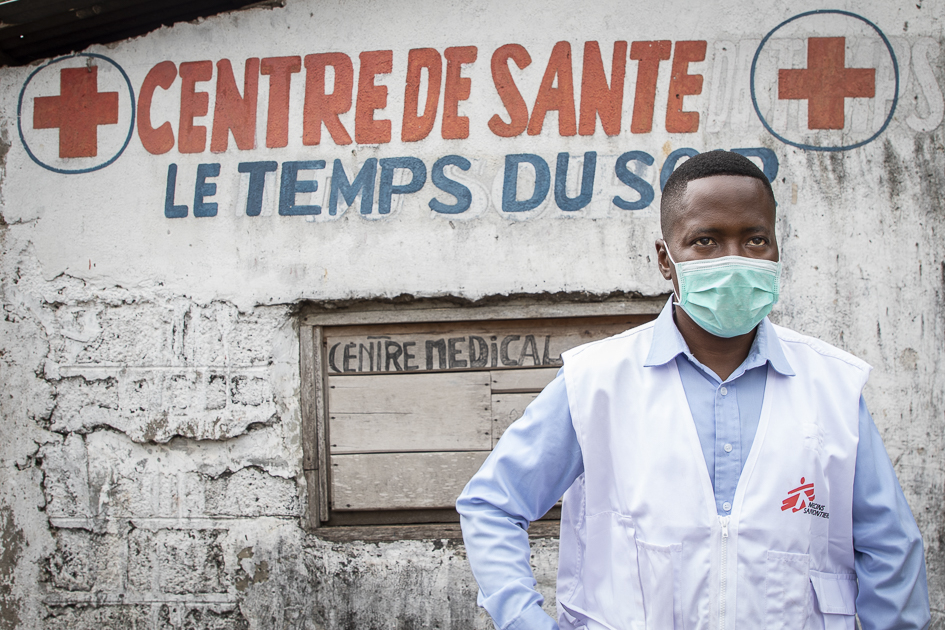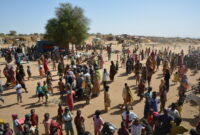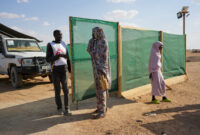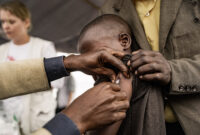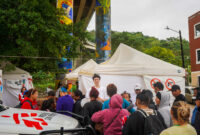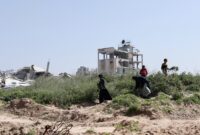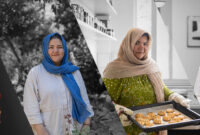Diseases, Epidemics and Pandemics
| Latest Facts |
|---|
|
• 1,320,100 vaccinations against measles |
|
• 59,400 people on first-line HIV anti-retroviral therapy |
|
• 4,970 people treated for meningitis |
|
• 10,384,000 outpatient consultations |
Mass outbreaks of cholera, Ebola, measles and tuberculosis have shaken healthcare systems across several countries, including Cameroon, Nigeria, Chad, Democratic Republic of Congo (DRC), Lebanon and Central African Republic (CAR). In 2019, DRC had its worst measles epidemic ever recorded. Tuberculosis (TB) kills 1.6 million people every year. That’s more deaths than COVID-19 globally to date. Malaria – one of the world’s deadliest parasites – infects over 200 million people – mostly children in Africa. That’s hundreds and thousands of children who will miss school due to a preventable disease. The coronavirus has affected virtually every region on earth, infecting tens of millions and killing more than 1.6 million people as of December 2020.
The most at-risk people are mainly those living in precarious, unstable conditions such as poverty, armed conflict and mass displacement, where healthcare systems are unreliable and medical services are limited or non-existent.
Doctors Without Borders/Médecins Sans Frontières (MSF) treats patients affected by widespread disease outbreaks and preventable illnesses.
What do we see?
In areas of conflict and great instability, outbreaks of infectious diseases, epidemics and pandemics can place even the most robust healthcare systems under immense strain.
People living in precarious conditions are at constant risk of being affected by disrupted healthcare services and medical supplies.
Moreover, preventable diseases like measles have taken hold on a large-scale across several countries, including Cameroon, Nigeria, Chad and Lebanon. DRC was particularly hard hit where the worst measles epidemic ever recorded continued throughout 2019.
Between August 2018 and June 2020, DRC experienced a resurgence of Ebola that spread to 11 health zones, posing significant logistical challenges to the delivery of immunization programs, with some areas like Équateur province only accessible by river using canoes.
Ongoing armed conflicts that involve indiscriminate bombings, shelling and shortages of supplies and staff at times lead to wide-ranging closures of country-operated health facilities.
Affected by war for a large part of the last decade, Yemenis have seen little to no sign of change. Over three million have been displaced since conflict started in 2015, with an estimated 20 million in need of humanitarian assistance. Recent outbreaks of vaccine-preventable diseases – diphtheria and cholera – combined with an upsurge in armed fighting have aggravated the already dire situation.
Our activities in Yemen are among the most extensive worldwide. In 2019, our field teams of 2,538 members have conducted 27,100 surgical interventions and 308,900 outpatient consultations.
Prevention is essential to saving lives
Political crisis and violence can shake the foundation of a healthcare system and cause it irreversible damage.
In CAR, almost half the population of 4.6 million people need emergency aid due to a highly insufficient public health system which was already in poor condition before the conflict started in 2013. Seventy-two per cent of public health facilities are either damaged or destroyed by reckless looting and violence.
With projects throughout the country, MSF has seen first-hand the increasingly worrying state of healthcare services in CAR. Our teams performed 967,000 outpatient consultations in 2019 amid conditions of pervasive insecurity. Teams treated 612,700 malaria cases and supported routine vaccination as well as mass immunization campaigns across CAR.
People living in crowded camps, detention centres and densely populated areas are extremely vulnerable to disease outbreaks, especially if water and sanitation services are poor.
People feel frustrated with the constant advice to wash their hands. If you only have 11 litres per day, how is this enough to wash your hands all the time?
Richard Galpin | Msf Water And Sanitation Expert
TWEET THIS:
Worldwide, more than 70 million forcibly displaced people — including refugees, the internally displaced, undocumented migrants and asylum seekers — have been affected by the coronavirus pandemic. They live in vulnerable living conditions that lack basic services like clean water, sanitation and inadequate access to reliable healthcare.
The COVID-19 pandemic has exacerbated these inequities by leaps and bounds.
Prevention measures such as self-isolation and physical distancing are impossible when one lives in a cramped tent with 10 other people.
According to UN Habitat, COVID-19 can be particularly threatening to the health of populations already living in inadequate housing as well as those affected by chronic diseases and health conditions such as asthma and tuberculosis.
Help support our medical work
Diseases, epidemics and wars are devastating families across the world.
At MSF, we deliver humanitarian medical care to those who need it, no matter where they are.
Having reliable funding we can count on gives us the ability and flexibility to react quickly to emergencies as they develop, as well as provide care for people caught in more chronic crises.
How do we respond to outbreaks?
MSF’s actions are first and foremost medical, forming the foundation on which MSF was built and remains our core purpose to this day. The needs of patients are at the heart of everything we do.
Through medical action, we strive to restore dignity and offer assistance to people in need.
Disease and epidemic outbreaks require rapid and effective medical response to control rates of transmission, infection and mortality. An outbreak can quickly escalate to an epidemic without a sustained strategy and an efficient logistics system in place to support the needs of people most affected by it.
MSF responds to outbreaks, epidemics and pandemics by:
|
• Maintaining logistics centres and warehouses that procure, test and store equipment. |
|
• Maintaining an independent supply chain of pre-packaged vaccination kits. |
|
• Launching essential medical services for when an emergency occurs. |
|
• Setting up mobile treatment projects to deliver medical aid to isolated areas. |
|
• Offering inpatient feeding programs for severely malnourished children. |
|
• Providing long-term healthcare support for large populations. |
|
• Speaking up about systemic barriers to healthcare access and treatment. |
|
• Raising awareness about the human cost of the lack of drugs for neglected diseases. |
Emergency supplies at the ready
Our cash reserves for emergencies mean we can provide lifesaving assistance quickly, when and where the needs are greatest. This means ensuring our supply centres are well-stocked with pre-packaged kits for various purposes ranging from surgical intervention, temporary inflatable hospitals, cholera and measles vaccinations and other emergency items.
A doctor isn’t much good to anyone in the middle of the desert if she doesn’t have her medicines delivered at the right time and place, at the right temperature. Without logistical support, we wouldn’t be able to work with the speedy and efficiency that we do.
Chris Houston | Msf Logistician
TWEET THIS:
Community Awareness
For highly contagious diseases like measles and meningitis, we raise awareness about the disease and the lifesaving importance ofprevention measures for populations at greater risk of outbreaks.
We continue to speak out about how the for-profit global pharmaceutical industry often leaves vulnerable people without access to the medicines they need to live a full life.
Some outbreaks happen instantly while some disasters arrive without warning — unfolding slowly over decades.
Beyond medical care, the scope and scale of MSF’s work allows us to advocate for fairer access to healthcare and devote resources towards research that helps improve systems meant for delivering aid in extreme situations.
Help support our medical work
